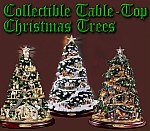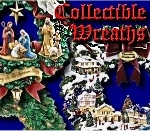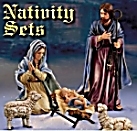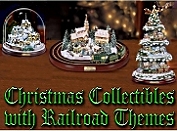| Written by Paul D. Race for Family Christmas OnlineTM |

|
Thoughts about Halloween, from Family Christmas OnlineTMEvery year about this time, I find myself dwelling on certain memories and questions regarding this much-maligned and often-abused holiday. Like my opinions on Christmas, I'm hesitant to judge other people for the way they choose to celebrate (or not to celebrate), as long as they exercise good judgment, moral sense, and charity towards those who approach the holiday differently. But some of my friends occasionally ask me how, as a Christian, I can use the word "Halloween" in a sentence without spitting on the ground or crossing myself or something afterwards. And others have trouble believing that I'm not fascinated by the macabre or occult like they are (a phase I outgrew by the time I was thirteen). Note: The first part of this article does not deal with the ridiculous, but oft-repeated urban legends about Halloween really being an outgrowth of ancient Druid practices. When I wrote this article I was under the mistaken impression that no one capable of discerning sense from nonsense was buying into those. But I was apparently wrong, which is why the "Update for 2015" below does address them, albeit briefly. We now return you to the part of the article that focuses on Halloween as it is actually celebrated and not inflammatory hoaxes about its origin. This is not an article as much as it is a general discussion of the parts of the season that I have enjoyed and of the reasons I don't get "bent out of shape" this time of year at seeing folks trying to have fun doing things I don't personally enjoy. So if you're looking for someone to take your side in an argument about Halloween, you should probably look elsewhere. If you don't mind other people reminiscing about how Halloween affected their childhood and their children's childhoods, read on. When I was a little kid, our family had a big box of "dress up clothes" that included ancient cloth masks, silky skirts, feather boas, and shawls, and other items that made it easy for my sisters to throw together a Gypsy costume or some such for "Beggar's Night" every year. Now I realize that those things probably came from my Dad's sisters, at least two of whom he helped raise after his father deserted the family during World War II. My costumes might include an old baby sheet with holes cut for eyes, or a bum costume consisting of patches stitched lightly on a pair of pants and burnt cork spread on my face. Or maybe the cowboy hats and toy guns we played with year-round. Or we'd put on Dad and uncle Ken's old helmet liners, backpacks, and fatigue shirts from their WWII service and go as soldiers. We didn't miss the chintzy, flimsy, and flammable store-bought costumes that some of our "better off" friends wore. In fact, as kids, we enjoyed throwing together our own costumes and felt sorry for kids who didn't have our resources. The Friday before Halloween, our elementary school would have a parade. All the kids would put on their costumes and walk to the foot of the hill and back, to enjoy cupcakes that our room parents had brought in. And we all walked or rode home in our costumes. Then on Beggar's Night, Dad would walk us all over our hilly little village. We'd finish up with sore calves and full bags of candy at a house that always served donuts and cider. In short, Donnelsville, Ohio, on Beggar's Night, was a magical place. Twenty-odd years later, when Shelia and I had little kids and had moved back to the area, it still was. Unfortunately, by then we were attending a church that condemned anything to do with Halloween. I can't blame them entirely. Between my halcyon childhood and the intense '80s had come a number of culture shifts. The "New Age" movement had spawned a renewed interest in dark and occult practices that triggered an alarmist response in Christian circles (including the troubling, but now-discredited book The Satan Seller). (By the way, that book turned out to be mostly, if not entirely fiction, but I actually knew two practicing Satanists and a number of "dabblers," so at the time its claims weren't exactly unbelievable to me.) Moreover, each October now spawned an onslaught of horror and slasher movies. You couldn't watch Saturday morning cartoons without seeing gross movie previews that they wouldn't even have shown in the theaters in my childhood. To say that Halloween movies gave the Halloween holiday a bad name would be an understatement. But some of the cultural shift was inside the church as well. We like attending churches that believe the whole Bible (making allowances for obviously metaphorical language, of course). But the church we were attending when our kids were little liked to "err on the side of caution." So they tended to condemn things that they really should have trusted their members to use their own judgment about. To make things even worse, for several years in a row, Beggars' Night fell on Wednesday. We all knew that missing Wednesday Night Service was the first sign of backsliding, even moreso if you missed it so you could expose your children to the enticement of such evil rituals as dressing up as princesses or ballerinas and walking around the neighborhood collecting candy. (We did buy candy for any visitors we might get, but our house sat so far back from the road that we seldom had any.) One Wednesday afternoon, when our oldest was about four, I let her dress up as a princess or some such, then took her up and down a nearby street, making certain we got back in time to get her changed for church. We survived. On a subsequent year, we took our then youngest with a friend down the hill to Donnelsville proper, where the houses were much closer together and everyone seemed anxious to show their generosity. There we encountered a Lutheran church that served popcorn and cider every Beggar's Night as a way of showing hospitality and getting to know their neighbors. When we mentioned to our church that Beggar's Night could be a good way of reaching their neighborhood, they tried a couple different approaches. Nothing "stuck," though, so eventually that church went back to having the lights off on Beggar's Night. In the meantime, however, Beggar's Night had shifted away from Wednesday nights. We no longer had to skip a service and risk being labeled backsliders if we went down the hill to Donnelsville and walked our children's little legs off going from well-lit house to well-lit house, catching up with friends, and finishing up at the house with the donuts and cider. In fact, it was rather like one huge annual block party. Sometimes I miss tromping up and down those hilly streets holding sweaty little hands. But by the time the youngest decided she was too old to trick or treat, we were just about too old to take her anyway, or at least I felt that way, over ten years ago. (Would that I had my 50-year-old knees back again.) That's not to say that the "dark forces" were never around. One of my daughters, while in high school, was invited to a party that went fine until her friends decided to watch The Exorcist. She spent the evening in the kitchen, with a couple other folks who didn't want to see it either. Some of the kids who had watched the movie later congratulated her for showing the "courage of her convictions." A spiritual victory, right? A few months later, she was invited to another party with mostly the same group of kids, and they decided to watch The Exorcist again. Once again, my daughter spent the evening in another room. But this time she was alone. When the movie was over, her friends chastised her for being "too good for them," and who did she think she was, anyway. A different lesson, I'm afraid. Now the kids are grown, and we don't have to worry about morality of "trick-or-treating" or a thousand other things. We still buy pumpkins and put up a scarecrow, and a few other decorations every fall. Yes, I'm put off by the thoughtless and sometimes dangerous pranks, as well as the gruesome and macabre aspects that dominate many Halloween celebrations, theaters, and airwaves. But I still enjoy candy corn, caramel apples, carving pumpkins, drinking hot cider, and seeing little kids (other people's kids) in costumes. (By the way, we still attend a church that thinks the whole Bible is true [barring obvious metaphorical language, of course], just not the church in the story which - sadly - got worse instead of better over the years.) As an adult Christian there's one other thing I appreciate about Halloween - the fact that it comes before Thanksgiving and Christmas. By the time November 1 rolls around, Halloween is "so last month." Nobody is interested in scary masks or creepy costumes or the like. This gives Christians four weeks to look forward to celebrating an early American religious community's Thanksgiving feast and seven weeks to look forward to celebrating the birth of Jesus. To some people, the "dark forces" may seem to own October. But we own November and December. This had a peculiar application in some of my workplaces where they tried to outlaw Christmas decorations because they promoted a worldview that was not "politically correct." As often as not, the people who thought I was violating their constitutional right to marginalize Christians by setting up a little tree or something were the same folks who went "all out" for Halloween. So when they came down on me for hanging tinsel or some such, all I had to do was remind them that Halloween started out as a religious holiday, too (part of Hallowmas, originally a time of commemorating every good person who had ever lived, including those who might not be in Heaven - yet, according to the Roman Catholic doctrine of purgatory**.) Moreover, the Halloween celebrants had put strobe lights in the halls, put black lights in the ceiling fixtures, hung rubber bats from the acoustic tiles, played "haunted house" sound tracks all week long on a boom box, and - on Halloween itself - come to work in a gorilla suit. Was getting me to take down my little table-top tree really worth the chance that upper management would make them give up their festivities, if they brought my "excesses" to light? I'm not saying that I necessarily enjoyed rubber bats hanging from the ceiling tiles, etc. Only that it "set the bar" for seasonal displays and celebrations far higher than we Thanksgiving and Christmas celebrants, bounded as we were by charity and (usually) better taste, could ever approach. In other words, for me, even when Halloween is uncomfortable, it serves as a prelude to Thanksgiving and Christmas, just as Fantasia's "Night on Bald Mountain" sequence is the prelude to the oddly calming "Ave Maria" sequence. Sure, someone may have hung a tasteless display on their front porch, but it will be down in a few days, and my Christmas lights may be up for weeks. In the meantime, my little great-nieces look really great in their pumpkin costumes. If you're looking for family-friendly Halloween resources, you'll find a few good links below. If you'd rather skip right past Halloween, check out our Thanksgiving pages. Update, 2015Just when I thought I had heard it all, a friend I respect very much just mentioned that he rejects Halloween (and I should, too) because it's a Druid holiday celebrating the Celtic god of the dead named Samheim. Also, according to the same man, Trick or Treat traces back to ancient Druids going door to door threatening Celtic peasants with bad consequences if they didn't give them food to sacrifice to their deity.I know a little about history, so I knew both assertions were wrong, period, but I figured I'd do a little more research and see if I could figure out how an otherwise sane person might be fooled into not only believing them but also using them as an excuse to tell everyone else that Halloween and Trick or Treat are intrinsically evil. By the way, there are real reasons some folks reject Halloween, such as the gruesome ways some people "celebrate" the holiday. If you reject Halloween and Trick-or-Treat based on such concerns, that's fine, I will respect your choice, just as I hope you will respect my choice to reject, say, Miley Cyrus videos. But if your rejection stems mostly from bad information you haven't bothered to verify, I reserve the right to disagree with your conclusions. What Historians SayI was not surprised to find that the Celts never had a god of anything named Samhaim or anything like that name. Or even a festival by that name or anything like that name. Samhaim was the Celts' name for the beginning of what they considered the winter season (about what we would call November 1). But all of those stories about festivals of the dead and so on are fictions invented within the last three centuries. There is no historical evidence whatsoever that the Celts believed any such thing or had any such practice. Neither was I surprised to find that there is no historical link whatsoever between the Druids and Halloween or Trick-or-Treat. In fact there's over a thousand-year gap between the end of the Druid religion and the rise of anything like Trick-or-Treat in any European culture. Several modern writers have asserted that Gregory made November 1 a holy day (All Saints' Day) to keep people from celebrating a Roman festival of the dead called Lemuria. Unfortunately for that assertion, Lemuria was celebrated in April. As a fan of history, I'm a great believe in dotted lines, but really? Other writers claim that Gregory set All Saints' Day on November 1 because the Irish (Celts) were used to celebrating a festival of the dead at that time. But there is no historical record of the Celts ever celebrating that kind of festival, on November first or any other time of year. In other words, all of the claims that Halloween and Trick-or-Treat are descendants (or revivals) of ancient pagan feasts are lies. Again, you can still hate Halloween or Trick-or-Treat for other reasons, just not this one. Lack of Evidence Cited as EvidenceIronically, one celebrated extremist cites the missing evidence as evidence that the Druids did invent both Halloween and Trick-or-Treat. According to him, the Druids passed on their occult practices and beliefs only by word of mouth. To this man, the fact that we haven't heard anything about their religion for nearly two thousands years is proof that they're still operating today. You can't argue with that kind of logic.Not surprisingly, the claim that the Druids or their spiritual descendants must still be flourishing today - since we never hear anything about them - is welcomed not only by hyperconservatives who are always looking for something to preach against or some new ancient evil to scare their congregations with. It's also welcomed by certain modern "New Age" groups. But not all. Some of them claim that it is the most ridiculous thing they have ever heard. On that, we're in agreement. Tracing the HoaxFor the following few paragraphs I am indebted to W.J. Bethancourt III, whose web articles on the subject pointed me to the historical source materials cited here. Apparently, the notion that Samhaim (or some such spelling) was the Celtic lord of the dead and that festivals were held in his name on November first was invented in the late 18th or early 19th century by a Charles Vallency. Apparently Vallency invented those fictions to support his assertion that the Irish originally came from Armenia. No one has ever taken Vallency's core proposal seriously, not even later writers who borrowed his invented Celtic history to support their own wild theories. Two sentences in the preceding paragraph start with the world "apparently" because we don't actually have anything written by Vallency. What we do have is a reference to his work in Godfrey Higgins' 1827 book The Celtic Druids. Although Higgins was attempting to prove that the Druids had migrated from India, not Armenia, he was not above borrowing Vallency's invented Celtic history to prove his own thesis. Historians who have since researched the Celts through legitimate archeological protocols unanimously agree that Higgins was wrong about almost everything, including the bits about Samhaim he claimed to receive from Vallency. But sadly, his book was a hit at the time. Higgins was already a best-selling author when the book came out, and its theme of an impossible ancient migration from India to Ireland reflected an even more popular and equally impossible theme - Anglo-Israelism. That's the nationalistic precept that the so-called "ten lost tribes of Israel" settled down in England, and therefore the English (and their descendants in North America) are really "God's Chosen People." (Recent genetic testing has disproven this ridiculous fiction once and for all, but white people looking for reasons to dispute the rights - or even the humanity - of non-whites still cling to it.) In a society prone to embrace such hoaxes, during a vacuum of any real knowledge of ancient Celtic cultures, Higgins' contemporaries republished his borrowed fictions about hitherto unknown Celtic practices as facts. Then later authors republished those assertions and added their own. In other words, all of the "evidence" that people use to prove connections between Halloween and ancient Celtic/Druid practices was fabricated about the year 1800, and has been repeated ever since 1827 by people who to lazy or too prejudiced by their own opinions to check the facts. Oh, before it comes up, the same thing is true of carving pumpkins, a North American practice. Apparently the Irish carved faces in turnips, but that tradition doesn't appear any earlier than the seventeenth century, so it was never practiced by the Druids either. And the ghost stories claiming that "Jack O'Lantern" represents a lost soul wandering the face of the earth have about as much relationship to history or the Druids as Washington Irving's "Legend of Sleepy Hollow." But What About "Authoritive" Sources?Good question. Folks who gleefully reject the entire Old Testament because we don't have any manuscripts dating to the time of Moses have an entirely different "academic" standard when it comes to the Druids. If you try to track down ANY connection between what we know about ancient Celts and Druids and the way Halloween is celebrated today, you'll discover that 99% of the "experts" cite no sources at all. And the few sources that are cited can't trace any verifiable references older than the 19th century. Here's a personal appeal: If you can track down an actual historical source that pushes the Samhaim-god-of-the-dead festival notion earlier than Vallency, or even earlier than Higgins, please let me know. Unlike Higgins and many others, I would rather publish truth than fiction, even if it disputes my own earlier opinions. On the other hand, if all you have is a modern writer who claims it traces back to the ancient Druids, and you think this proves some kind of point, please go back to your reality television show. Urban Myths Are Not a New PhenomenonIn other words, even though some aspects of the way Halloween is celebrated in modern times may be traceable to the 18th century or earlier, nothing about Halloween (or Trick-or-Treat or Jack-O'Lanterns) can be connected to the Druids or any ancient pre-Christian culture. Like the fraudulent nineteenth-century "histories" that purport to trace Easter Eggs and Easter Bunnies to ancient Saxon or Assyrian practices, the claim that Halloween is an outgrowth of ancient Celtic/Druidic practices is the nineteenth-century's version of an urban legend, one of thousands that actual historians have laid to rest long since. Sadly, the facts that these myths stay popular, and that some folks even seek them out are just more evidence that people would rather believe compelling lies than some dull old truth. Of course, there are legitimate reasons for any individual to boycott Halloween. You just can't use supposed Druid origins to do so. Unless, like Higgins, you have no problem with borrowing other people's fabrications to make a point. Should Christians Avoid This Stuff Anyway Just in Case?There are many legitimate reasons for boycotting Halloween, of course. For example:
All of those reasons, from the trivial to the tragic, are good reasons for anyone to boycott Halloween (and Trick-or-Treat and Jack-O'Lanterns). However, not one of them is a good reason to blast your friends or fellow disciples for carving pumpkins or letting their kids dress up as cowboys or princesses and go trick or treating. That is a matter of conscience that each family must decide for themselves. If you use lies and rumors to bully people into giving up Halloween or Christmas or anything else that the witch-hunting Puritans used to persecute people for, you're not doing them or yourself any favors. In fact, if your religion is mostly a list of innocuous things to avoid for obscure reasons, you may be a stranger to gace yourself. That said, is it possible for Christians to engage in the arguably innocuous aspects of Halloween, such as trick-or-treating or carving pumpkins? In my research, I came across a useful example of some guidelines that a conservative Lutheran wrote for how he believes Christians should celebrate Halloween (if they choose to celebrate it it at all). Click here to read them. If you want more background on the great Halloween hoax, the first three pages of the same article provide some good information. The author's conclusion is based partially on his understanding of Philippians 4:8 ("Finally, brethren, whatever is true, whatever is honorable, whatever is right, whatever is pure, whatever is lovely, whatever is of good repute, if there is any excellence and if anything worthy of praise, dwell on these things." - NASB). Is there anything good about the gruesome or horrific ways some people "celebrate" the holiday? Not to my way of thinking. On the other hand, once you remove the totally fictious connection to ancient pagan festivals, is there anything intrinsically evil about carving pumpkins or children playing dressup and collecting candy from willing neighbors? That's for you to decide, not me. In the meantime, I will sympathize with folks who don't bother Halloween because they're not emotionally invested in the holiday and they're too busy to try to live up to other folks' expectations. I will continue to look charitably on folks who don't see anything wrong with their kids dressing up, say, as Spiderman and collecting candy from neighbors who have bought it for just this purpose. I will also look charitably on folks who avoid Halloween because so much about today's "celebrations" is far too gruesome and tasteless. I will even attempt to be charitable to folks that criticize how everyone else views or celebrates the holiday because they would rather swallow and repeat inflammatory fictions than make judgments based on facts. But I might be gritting my teeth in the last instance. In other words, have fun and don't do anything that makes you personally feel uncomfortable, and don't listen to people who get their seasonal "kicks" out of making other people feel uncomfortable. Family-Friendly Halloween ResourcesThe next part of this page contains links to things you and your family can do to celebrate the season. Below that is some reader feedback that I found enlightening and in some cases entertaining.
In the tradition of the Japanese cardboard Christmas ("putz") houses that graced so many American homes between 1929 and 1964, "Putz house" designer Howard Lamey has designed several Halloween-themed structures to help you get an early start on your Holiday Village. Each project provides free, downloadable graphics and plans, as well as detailed instructions.
|



|
To return to the Christmas Musings page, click here.
To return to the Family Christmas OnlineTM Home Page, click here.
Note: Family Christmas OnlineTM is a trademark of Breakthrough Communications(tm) (www.btcomm.com). All information, data, text, and illustrations on this web site are
Copyright (c) 2006, 2007, 2008, 2009, 2010, 2011, 2012, 2013 by Paul D. Race.
Reuse or republication without prior written permission is specifically
forbidden.
Family Christmas Online(tm) is a participant in the Amazon Services LLC Associates Program, an affiliate advertising program designed to provide a means for sites to earn advertising fees by advertising and linking to amazon.com.
For more information, please contact us

| 
| 
| 
| 
|